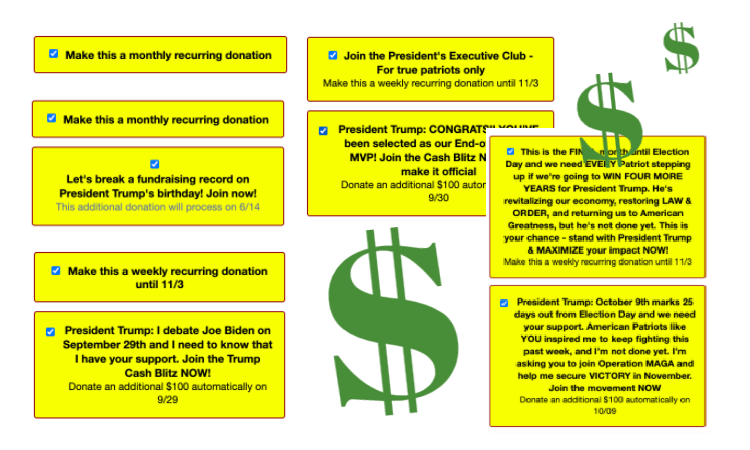By Jeff Domansky, April 5, 2021
The New York Times recently broke the story about a payments scam by the Trump 2020 campaign as it struggled at the height of last fall’s election.
Radio conspiracy host Rush Limbaugh raised dire warnings about the struggling Trump campaign’s desperate need for money.
The campaign payment processor WinRed responded with a scheme to dupe unwitting donors into recurring donations without realizing it.
What fine print?

As often the case, few supporters read the fine print online. Donors had to wade through opaque online-print disclaimers and manually uncheck a box to opt-out of recurring payments.
Hundreds of thousands didn’t.
“As the election neared, the Trump team made that disclaimer increasingly opaque, an investigation by The New York Times showed. It introduced a second prechecked box, known internally as a “money bomb,” that doubled a person’s contribution. Eventually, its solicitations featured lines of text in bold and capital letters that overwhelmed the opt-out language,” the Times reported.
“Never seen anything like this”
“This is no small thing,” said CNN anchor John Berman. “I’ve never seen anything like this. The Trump campaign and RNC had to make 530,000 refunds worth more than $64 million. Again, I’ve never heard anything close to that in campaigns before. This shows you. This is an epic, you know, an epic systemic issue.”
Analyst John Harwood responded:
“On behalf of those people who loyally stood with Donald Trump, who backed him, believing he was their champion, and then to find that the for-profit company that worked with the Trump campaign set up this situation where they would extract money out of your bank account, they would even double the amount that you had said you wanted to contribute by having pre-checked the box that said you want to double your contribution?” said Harwood.
“Yes, sure, the Trump campaign may have wanted you to double your donation. It’s one of the sad realities of the way Donald Trump operated that he fooled a large number of people who are paying for it now,” Harwood added.
The “money bomb”
Banks and credit card companies were overwhelmed with fraud complaints from Trump supporters.

Recurring withdrawals from their bank account scammed seniors such as 78-year-old California resident Victor Amelino as a result. Amelino’s $990 donation reached nearly $8,000. “Bandits!” he told the Times. “I’m retired. I can’t afford to pay all that damn money.”
Kansas City hospice care and cancer patient Stacy Blatt could hardly afford $500, but he was a believer. He donated. His $500 was withdrawn the next day and then weekly through mid-October without his knowledge until his account emptied and his utility and rent payments bounced.
Thousands of others, including retirees, military veterans, nurses, and even experienced political operatives, were snared by the “money bomb” tactic.
Recurring donations boomed; so did complaints
From early June 2020, the campaign fine-tuned the auto-fill checkboxes to make opting out less transparent and harder for donors to notice.
The money bomb boxes proved very effective at raising money.

Unfortunately, complaints jumped just as high, with refunds going from 2.18% to 12.29% at the Trump campaign’s height. Biden campaign refunds stayed flat at 2.24%.
“It started to go absolutely wild,” one fraud investigator at Wells Fargo told the Times. “It just became a pattern,” said another at Capital One.
The result was predictable. Credit card limits exploded. Some donors canceled cards to avoid recurring payments. Overdraft fees and other charges appeared on customer statements.
Even Jeff Kropf, executive director of the conservative group Oregon Capitol Watch Foundation, missed the “money bomb” checkbox. “Until WinRed fixes their sneaky way of adding additional contributions to credit cards like they did to me, I won’t use them again,” he said to the Times.
In the last desperate days of the Trump campaign in October and November 2020, donors and supporters received an average of 15 hyperbolic email donation pleas.
The money poured in. The complaints grew louder.
Refunds, refunds everywhere
“In the final two and a half months of 2020, the Trump campaign, the Republican National Committee, and their shared accounts issued more than 530,000 refunds worth $64.3 million to online donors,” the Times investigation shows. By contrast, the Biden campaign made 37,000 online refunds of $5.6 million in that time.

According to federal records, the Trump campaign and RNC refunds totaled 10.7% of the money raised on WinRed in 2020, while the Biden campaign refund rate was 2.2%.
Several banks said WinRed fraud claims totaled as much as 3% of their customer complaint workload.
The Times surveyed Federal Election Commission filings for both Trump and Biden campaigns. It reviewed the donation-processing sites WinRed and ActBlue and daily refunds issued. It spoke with dozens of Republican donors and campaign officials, campaign finance experts, and consumer advocates.
Many campaign refunds occurred because they exceed legal limits. But the Trump campaign scam was over the top and widely criticized by both political operatives and bank and payments industry experts.
Can recurring donations be defended without transparency?
WinRed said donors typically receive at least one follow-up email in advance of recurring donations and said it offers 24-hour customer service for donor refunds.
“WinRed wants donors to be happy and puts a premium on customer support,” Gerrit Lansing, WinRed’s president, told the Times. “Donors are the lifeblood of GOP campaigns.” Lansing pointed out Democrats and ActBlue had also used recurring programs.

Trump spokesman Jason Miller downplayed the $122.7 million refunds during all of 2020. Miller claimed 0.87% of its WinRed transactions were the subject of formal credit card disputes. “The fact we had a dispute rate of less than 1% of total donations despite raising more grass-roots money than any campaign in history is remarkable,” he boasted to the Times.
Nonetheless, the campaign continued its checkbox money bombing through mid-December 2020, raising tens of millions more dollars for the new PAC Save America.
As the Times reported: “Unlike ActBlue, which is a nonprofit, WinRed is a for-profit company. It makes its money by taking 30 cents of every donation, plus 3.8 percent of the amount given. WinRed was paid more than $118 million from federal committees the last election cycle.”
Even after standard payment processing fees and expenses, there’s a substantial profit for WinRed.
Money and fools
As Richard Armour once said: “That money talks, I’ll not deny, I heard it once: It said, ‘Goodbye'” and that certainly seems true in the case of political fundraising.
Then there’s the poem Losing Control, where Jay Ferguson writes:

A fool and his money
Are very soon to be parted
And the last thing he tells you
Is “I’m only getting started…”
With a new Trump website just launched, GOP supporters can soon expect recurring pleas for support. Read the fine print and uncheck the boxes!
Cancer patient and Trump supporter Stacy Blatt died in February. I wonder if future political donors, campaign operatives, and payment processors will remember those 530,000 lessons?
You may also enjoy these other recent PaymentsNEXT stories about payments and politics:
Stripe stops payment processing for Trump campaign
Shopify shutters Trump online stores








LET’S CONNECT